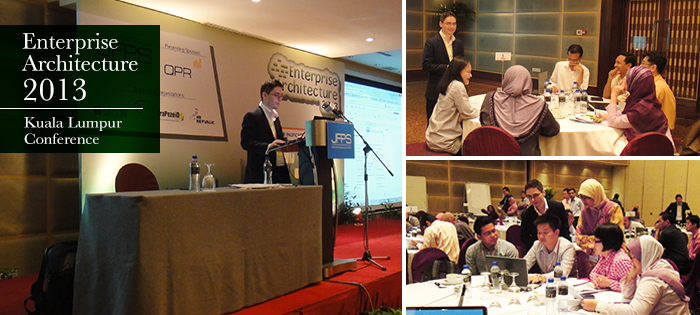At the invitation of JFPS, Aurel Brudan, the CEO of The KPI Institute has delivered a one day workshop as part of the Enterprise Architecture 2013 conference, that took place in Kuala Lumpur, Malaysia. Aurel, a TOGAF 9 certified Enterprise Architect himself, noted the context of the session: “In January 2013, Gartner published a study that estimated that less than 44% of Enterprise Architecture practitioners have any defined metric. The KPI Institute established a repository of over 100 Enterprise Architecture KPI examples that are a good start to discovering what EA KPIs are all about and how to go about selecting meaningful ones.”
The event attracted over 70 professionals with an interest in this emerging discipline. The main industries represented at the event were resources (oil and gas), utilities, telecom, ICT, retail and public sector. Enterprise Architecture teams in represented organizations ranged from 0 to 17 staff, with an average of 8.
Some of the challenges for Enterprise Architecture outlined by participants are:
- Managing people
- Business vs. IT (relationship dynamics)
- Meeting business expectations
- Achieving management understanding/Acceptance
- Budget constraints
- Expertise and skillsets
- Standards establishment and compliance
- Legacy systems integration
The workshop was interactive with 10 teams being formed, each working on establishing KPIs, Scorecards and Dashboards for an EA department.
Some of the KPIs proposed by participants for discussion were:
Financial
% Cost Reduction by process optimization
$ Expenditure to operational budget
$ Revenue
% Cost saving from service reuse
$ Cost savings
$ Capex disbursement
Internal customer
% Customer Satisfaction Index
Internal processes
% Compliance of security posture
% EA engagement for all projects
% ITIL compliance for project delivery
% Projects delivered on time and within budget
% Architecture compliance
% Process improvement and optimization
% ISO 20000 certification criteria fulfilled (environmental compliance)
% Reduction in data sources
% Reuse of existing system components
# eSOP created(EA checklist and manual)
% Uptime
% Project completion on-time
# Policies
% Project within budget
% Project delivered within project timeline
# Scope changes
% Compliance with regulatory requirements
% Error free
% Compliance to architecture guidelines and standard
% Projects on time and on budget
# Rework
Learning and growth
% TOGAF certification on all EA personnel
% Staff trained
# Talents attracted
# EA trainings
# Training hours for technical skill enhancement
# EA training man-days
% Staff certified
% Innovation ideas implemented
# Initiatives proposed
# Hours staff trained
# Initiatives approved by management
% Savings on IT infrastructure
In addition to these brainstormed ideas, over 100 Enterprise Architecture specific and 30 generic operational KPIs researched by The KPI Institute were presented.
The session concluded with an articulation of objectives/KPI/initiatives and Enterprise Architecture Dashboard establishment by each team and sharing of good and bad practice in measuring Enterprise Architecture with KPIs.
The workshop was well received by participants mainly due to the rich content and hands-on approach, many leaving the workshop with several new ideas on the do list. The session’s success was acknowledged by the event organisers with a certificate of appreciation for an exceptional presentation on the topic of KPIs in Enterprise Architecture.
For more details about Enterprise Architecture KPIs, visit www.smartKPIs.com or buy the Top 25 Enterprise Architecture KPIs of 2011-2012 research report.


